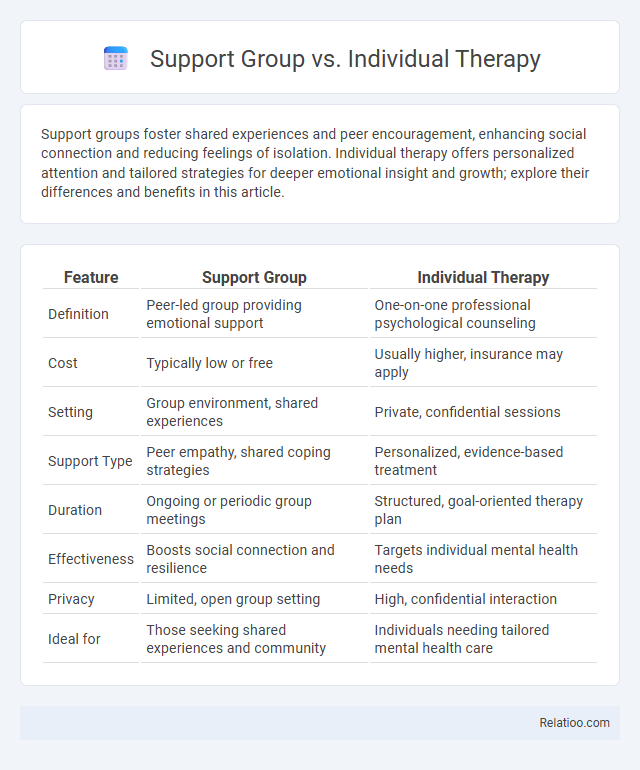Support groups foster shared experiences and peer encouragement, enhancing social connection and reducing feelings of isolation. Individual therapy offers personalized attention and tailored strategies for deeper emotional insight and growth; explore their differences and benefits in this article.
Table of Comparison
| Feature | Support Group | Individual Therapy |
|---|---|---|
| Definition | Peer-led group providing emotional support | One-on-one professional psychological counseling |
| Cost | Typically low or free | Usually higher, insurance may apply |
| Setting | Group environment, shared experiences | Private, confidential sessions |
| Support Type | Peer empathy, shared coping strategies | Personalized, evidence-based treatment |
| Duration | Ongoing or periodic group meetings | Structured, goal-oriented therapy plan |
| Effectiveness | Boosts social connection and resilience | Targets individual mental health needs |
| Privacy | Limited, open group setting | High, confidential interaction |
| Ideal for | Those seeking shared experiences and community | Individuals needing tailored mental health care |
Understanding Support Groups
Support groups offer a unique environment where you can share experiences with others facing similar challenges, providing emotional support and practical advice. Unlike individual therapy, which focuses on personalized treatment plans with a licensed therapist, support groups emphasize peer connection and mutual encouragement. Understanding support groups helps you recognize their role in fostering community resilience alongside professional care.
Defining Individual Therapy
Individual therapy is a one-on-one psychological treatment focusing on personal emotional and mental health challenges, tailored specifically to your unique needs. Unlike support groups that offer shared experiences and collective encouragement, individual therapy provides confidential, in-depth exploration of thoughts and behaviors. Care in mental health encompasses broader support systems including therapy, medication, and daily assistance, but individual therapy isolates the therapeutic process to enhance personalized growth and healing.
Key Differences Between Support Groups and Individual Therapy
Support groups provide a communal space for sharing experiences and mutual encouragement, while individual therapy offers personalized, one-on-one guidance tailored to your specific mental health needs. Support groups emphasize peer interaction and collective healing, whereas individual therapy focuses on professional diagnosis, treatment plans, and confidential emotional exploration. Your choice depends on whether you value group dynamics or specialized, individualized care.
Benefits of Support Groups
Support groups provide a unique benefit by fostering a sense of community and shared experience, which can reduce feelings of isolation and increase motivation for recovery. Unlike individual therapy, support groups offer peer-led encouragement and real-life insights, creating a supportive network that complements professional care. Your participation in a support group can enhance emotional resilience and provide practical coping strategies through collective wisdom and empathy.
Advantages of Individual Therapy
Individual therapy offers personalized attention tailored to Your specific mental health needs, enabling deeper self-exploration and targeted interventions. This one-on-one setting promotes a stronger therapeutic alliance, facilitating trust and open communication, which often leads to more effective treatment outcomes. Confidentiality in individual therapy ensures a safe space for discussing sensitive issues without the influence or distraction of group dynamics.
Drawbacks of Support Groups
Support groups for mental health can provide community and shared experiences but often lack personalized attention, making it harder to address individual nuances of your condition effectively. Unlike individual therapy, support groups do not offer tailored strategies or confidential one-on-one sessions, which may limit the depth of emotional processing and progress. Also, the variability in group dynamics and potential for groupthink can sometimes hinder honest self-expression and personal growth.
Limitations of Individual Therapy
Individual therapy offers personalized mental health support but may lack the diverse perspectives and shared experiences found in support groups, limiting social connection and peer validation. It can also be more costly and time-consuming compared to group formats, restricting accessibility for some clients. Furthermore, individual therapy may not provide the same level of community support or opportunity for learning from others' coping strategies, which can be critical for conditions like addiction or chronic illness.
Choosing the Right Approach: Factors to Consider
Choosing the right approach between support group, individual therapy, and care depends on your personal needs, goals, and comfort level with sharing experiences. Support groups offer community and shared understanding, individual therapy provides personalized attention and targeted interventions, while care services focus on comprehensive and ongoing support for complex conditions. Assess factors such as severity of issues, privacy preferences, and desired outcomes to make an informed decision tailored to your mental health journey.
Common Conditions Treated by Each Method
Support groups effectively address common conditions such as anxiety, depression, and chronic illness by fostering community and shared experiences. Individual therapy targets a wide range of mental health issues including PTSD, bipolar disorder, and severe depression through personalized treatment plans. Your care approach depends on the severity and type of condition, with support groups aiding in coping skills, individual therapy focusing on in-depth emotional healing, and professional care providing medical management for complex disorders.
Combining Support Groups and Individual Therapy for Optimal Results
Combining support groups and individual therapy enhances mental health outcomes by merging collective empathy with personalized treatment plans. Support groups offer shared experiences and peer encouragement, while individual therapy provides tailored strategies addressing your unique challenges. Integrating both approaches maximizes emotional resilience and accelerates recovery through comprehensive care.

Infographic: Support Group vs Individual Therapy
 relatioo.com
relatioo.com